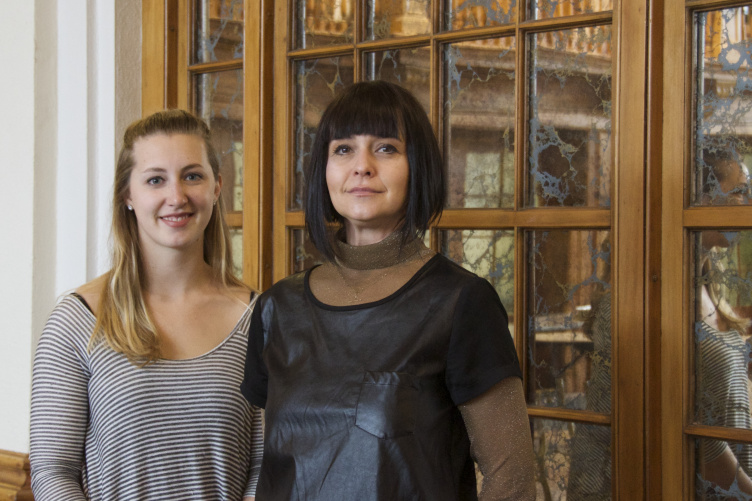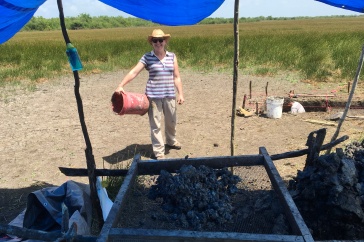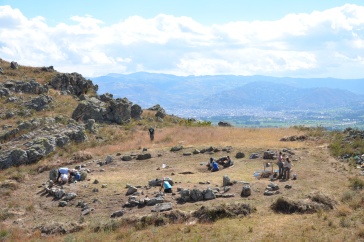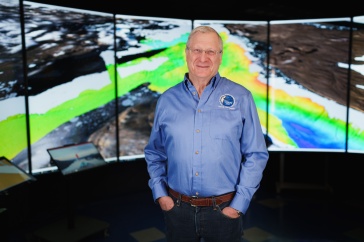
Emily Ham '16 and Svetlana Peshkova, associate professor of anthropology
"The most effective way to destroy people is to deny and obliterate their own understanding of their history.” ~ George Orwell.
The International Criminal Court in The Hague is known for the prosecution of crimes against humanity. On Tuesday, the tribunal heard the first-ever arguments against an individual charged with the destruction of world heritage sites. Prosecutors want the Islamist leader alleged to be responsible for the ruination of 15th century artifacts in Timbuktu to be charged with war crimes.
Whether or not the case moves forward is unlikely to stop the cultural massacre taking place in Iraq and Syria, where ISIS has been systematically destroying the countries’ histories. Among what has been demolished is the Arch of Triumph located in the 2,000-year-old city of Palmyra, Syria, the tomb of the prophet Jonah and, in one Iraqi city, more than 100 of its churches. Some of the relics have been bombed, some were bulldozed, some were attacked by hand with sledgehammers.
“Without knowing our past, we can’t creatively conceive of our future.”
Fear that the ruination would continue, if not in Syria and Iraq then in other countries around the world, is what led Svetlana Peshkova, associate professor of anthropology, to create a research internship in cultural heritage.
The program grew out of a talk hosted by the anthropology department that had the Boston-based nonprofit American Society of Oriental Research (ASOR) discussing why ISIS is annihilating Syrian’s heritage. Founded in 1900, ASOR supports research into, and public understanding of, the history and cultures of the Middle East.
“We are losing our human heritage. It’s not just in the Middle East; it’s not just Africa or the region. It’s the whole human society. It’s how we learn,” Peshkova says. “Without knowing our past, we can’t creatively conceive of our future.”
Launched in 2015, the research internship had UNH students Emily Ham and John O’Neill, both of the class of 2016, working with ASOR’s cultural heritage initiatives team to document the ruin of churches, museums, tombs and other ancient sites in Syria and northern Iraq. Two reports the pair helped author were published in September.
Using newspaper accounts from around the world coupled with satellite imaginary, Ham and O’Neill helped compile weekly accounts that detailed the histories of the artifacts and heritage sites demolished and those that remain under threat.

“ASOR is doing an amazing job documenting the history that could be lost forever. This is important because it belongs not only to Syrians or Northern Iraqis, but to us all. The Middle East is the heart of human civilization and there is so much to be learned from it,” Ham says.
An anthropology and international relations major, Ham talked of the daily tracking of news in Syria through newspapers and social media outlets like Twitter, Facebook and YouTube.
“We had to be on our toes all the time regarding bombings, lootings — anything that could effect destruction of the country’s cultural heritage,” Ham says, adding, “It was a very humbling experience to know what was happening. It put things in perspective, realizing the project is necessary and deserves support.”
Ham and O’Neill read 20 articles per week, analyzing them and then summarizing what they learned in a report. The written histories of sites and relics that have been destroyed included the period they were from, who made them and the faith with which they were associated. Much of what has been lost was built during the Roman Empire (27 BC – 1453).
“This program, and all of American Society of Oriental Research’s efforts, has had an enormous impact on the region,” says O’Neill, a history major. “It's important in understanding the situation as a whole. It's not just stolen statues and satellite images of dig sites. It's much bigger than that. It's about what of humanity will be left after the dust settles.
Peshkova would like to see the internship offered in any major and has already gotten support for next fall from international affairs, political science and Middle Eastern studies.
“Students would be doing something that matters while learning to analyze sources and information. At the same time, they would be getting the message out to the general public. It’s an incredible opportunity,” Peshkova says.
-
Written By:
Jody Record ’95 | Communications and Public Affairs | jody.record@unh.edu
















































